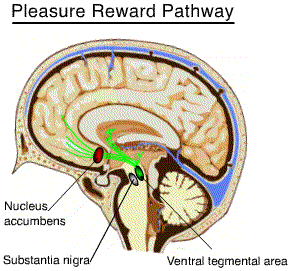The Nucleus Accumbens
is an area within the brain that pertains to a system that involves other brain
areas. This system is called the mesolimbic dopaminergic system. Meso means
brain and limbic is the region were these systems are found, and dopaminergic
because these areas have specialized cells (called neurons) that synthesis and
release dopamine. This system is mainly comprised of the Ventral Tegmental Area
(VTA) and the Nucleus Accumbens (NAcc).
The VTA, upon receiving stimuli, secrets Dopamine in the NAcc. This secretion
of dopamine in the NAcc creates a reinforcing and rewarding effect on the drug
that caused the stimuil (Jerlhag et al, 2010; Thorfinn et al, 2012; Nieh et al,2012; Salamone et al, 1997). When
we say reinforcing we mean that it will make you want more, and when we say
rewarding we mean that the drug will make you feel good and you’ll like it.
Although it may seem like something bad because it involves drugs, it is
actually critical for survival. This is because food intake and sex have their
rewarding and reinforcing effects here. So, imagine that this system doesn’t
exist and for the first time you eat something (like when, for the first time,
you drink milk from your mother when you are born), if you don’t like or feel
any kind of sensation that makes you say “mmmm this is good”, then you’re just
not going to be motivated to eat it again. If this occurs with the milk of the
mother and her child, what else is he going to eat when he is just a few days
old and can’t swallow or take anything else but milk? Nothing, so the survival
of the child is threatened. If every newborn in the world were to suddenly be
born without this system, then survival of the human race is at stake. Now that
we understand how powerful the motivational effects of stimulating the NAcc are
in order to secure survival, we can understand why it is so hard for many
addicts to stop taking a drug that has its stimulating effects in the NAcc.
Now, when we correlate this to anxiety, we must ask ourselves what happens when
we like something (we are motivated to get it) that we cannot have and
desperately want?. The answer is not that difficult, we may get frustrated
and/or stressful. Stress leaves to anxiety which means heightened blood
pressure, heightened heart rate, muscle contractions and everything that you
get when you’re in a “fight or flight” mode but in a prolonged manner.
Prolonged stress can make you feel horrible, like your dying and you can’t do
anything about it, and who wants to feel that way? Nobody, so when it gets worst
and worst and worst you get to the point where you say enough is enough and if
you’re an addict in abstinence you may want to take the drug to alleviate these
symptoms. This, and many other factors that go beyond the scope of this blog,
are the reason for why so many people that try stopping the use of a drug,
which they are addicted to, are not able to continue abstaining (Sinha, 2009; Zhanget al, 2014). Suppose that
you managed to absolutely abstain and now your system is free of the drug you
were addicted to, what happens if you come in contact with the environment or
the drug? To answer this question we must understand that
drugs are normally associated to something; it can be a place, a song, a movie,
anything to which when you took that drug you were constantly exposed to. For
example, people that take their coffee (which act on the same system) when they
are reading the newspaper. Every time you read the newspaper, you drink your
coffee. The repetition of this pattern creates an association, so the next time
that you’re reading your newspaper and you are not having coffee, you will feel
like something is missing, and that something is the coffee. But this is not
the only thing you will feel, you will also feel the same good sensation that
comes when you drink your coffee, even though you’re not drinking it. As
expected this good sensation will make you say “why am I not drinking my coffee
if it feels so good”, and you’ll get up, if you’re seated, and go get your
coffee. If you can’t get your coffee you’ll probably get irritated and anxious.
Back to our question, this association practically lasts forever, so even
though you haven’t taken the drug for years and years, when you are in presence
of that associative thing or place, it will remind you of how taking the drug
made you feel, and this my friends is why so many people relapse or, in other
words, resume taking the drug (Shimamoto et al, 2014). The anxiety you will feel because you
can’t have that great and pleasant stimuli, that the drug gave you, is so
powerful that it can make you go back to your old bad habits of taking the
drug. Anxiety is only one of the many factors that contribute to relapse and
the unsuccessful stopping of drug use in many addicts.

No comments:
Post a Comment